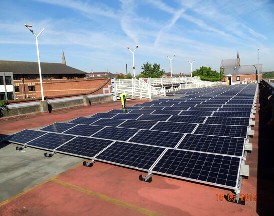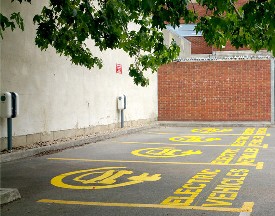Rotherham Metropolitan Borough Council’s Full Set
Whilst we have seen residential customers installing the complete set of solar PV, battery storage, and electric vehicle chargepoints, it’s something of a rarity at a larger scale. Rotherham Metropolitan Borough Council, however, have just completed a £600k scheme installing electric vehicle charge points across the borough, combining this with solar PV and battery storage at some of the sites.
Steve Brown, Transportation Officer, explains: “We’ve been very interested in the potential to replace our diesel/petrol fleet with electric vehicles to reduce carbon emissions and address air quality in the borough. But we were very aware that doing so would increase our electricity consumption, and nationally there’d be a problem generating the electricity. So we have looked to manage these knock-on effects ourselves by installing an equivalent amount of solar PV at the same time to offset this.” And it’s not just the amount of new electricity that was a concern: “We wanted to use batteries to store this sustainable energy for us to use when we needed it, rather than when it was available”
Developing the Scheme
The flagship site in the programme is the Wellgate multi-storey car park, which features 5 dual Alfen Eve charge points, 87kW of solar PV and 3 Tesla Powerwall’s for storage. The solar PV was hosted in a unique way, on the top deck of the multi-storey. “It’s an odd feature of almost every multi-storey car park in the country that no-one parks on the top-deck”, says Steve. “They’re massively underutilised assets, so we took the decision to close the top deck and use this space for generating solar electricity.”
An additional five sites incorporated both solar PV and electric vehicle charge points. Hellaby Depot, Rawmarsh Library, Riverside House, Rother Valley Country Park, and Thrybergh Country Park host 17 dual charge points and 141 kW of solar PV.
Aston Health Centre, Drummond Street car park, Walker Street car park and Wath Library are also home to dual chargepoints, increasing the coverage of the public EV charging network in the Rotherham Metropolitan area.
If we build it, they will come
“The main difficulty we had was whether the scheme would work at all”, said Steve. “There’s a certain amount of ‘If we build it, they will come’ when developing a chargepoint scheme. But Rotherham does not have the same level of per capita income as parts of southeastern England, and we didn’t know how quickly the community here will take up EVs, as they are still more expensive than petrol or diesel vehicles.”
Funding from the Government’s Clean Air Fund early measures programme provided the initiative to get the scheme off the ground, and Rotherham Metropolitan Borough Council instructed Joju Solar to install the project, following a mini-tender through the ESPO Framework. Joju Solar are uniquely well placed to deliver schemes like this as we are one of the largest installers of Public Sector EV charge point programmes, as well as having decades of experience installing solar PV and battery storage.
“Our fears have been unfounded – the chargepoints are being widely used, and people are prepared to use charge points at outlying council offices and country parks. From our point of view, it’s worked extremely well”. The Council are seeing the solar PV generation being used on their own sites, reducing bills, and the battery storage is covering lighting requirements overnight.
A Holistic Public Sector Approach to EV Charge Points
Rotherham’s approach appears to be paying dividends, and there’s an appetite for more. “The whole system has been really well thought out – there’s chargers in the basement for staff and outside for public use. We’d like to do more of the same – perhaps in innovative locations like schools and colleges as well”.
Rotherham Metropolitan Borough Council’s pioneering scheme is a strong example to other councils, particularly in the way that they have looked at the larger energy picture. Electrifying transport will inherently increase demand for electricity, and it shows a truly holistic approach to sustainability to consider how this will be provided as part of one installation programme.
Find Out More
- We’ve developed the Joju Charging Portal – an information hub for public sector bodies looking to install electric vehicle charge point programmes
- The Rotherham Metropolitan Council scheme was procured through the ESPO framework
- See how the complete set of solar PV, battery storage and electric car charge points can help in the home






